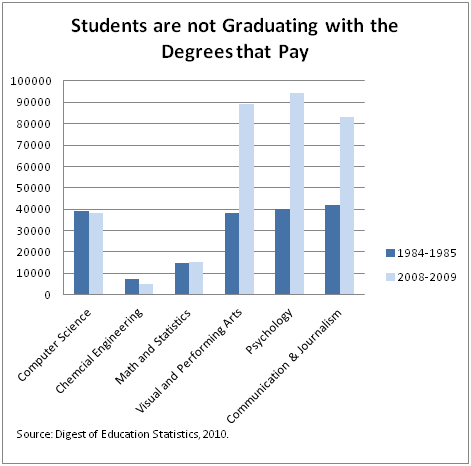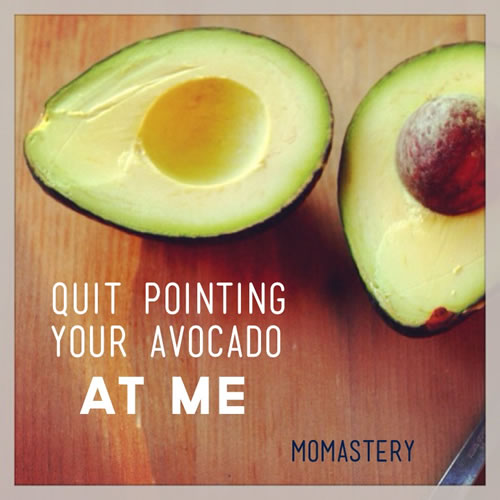The New York Times has a long and fascinating article about Jason Everman, who played for and was then kicked out of first Nirvana and then Soundgarden, each time just before the bands really hit stardom. How do you recover from that fortune-whiplash? You join the army, become a ranger, and then join the special forces, apparently. Article doesn’t strike me as particularly insightful or impressive, but the story alone makes it worth the read.
Society
The Problem with High Tuition and Student Loans
Take a look at the chart, folks.
It’s an old chart from a Marginal Revolution post back in 2011, but WalkerW (who comments here at DR) just showed it to me the other day. And I mean, come on. We’ve got less comp sci grads, but we’re doubling down on Visual and Performing Arts, Psychology, and Communications & Journalism? Who are these people, and what do they think college is for? The idea of a liberal arts education–that you go spend four years living the life of the mind–is quaintly romantic I suppose, but it’s also (in no particular order):
- Dangerous
- Elitist
- Deceptive
The Societal Benefits of Monogamy
In a long-running discussion about same-sex marriage, one of the participants asked a simple question. It was (paraphrasing): What’s so great about monogamy, anyway? The answer, in part, is that:
…imposing monogamous marriage reduces male reproductive competition and suppresses intra-sexual competition, which shrinks the size of the pool of low-status, risk-oriented, unmarried men. These effects result in (i) lower rates of crime, personal abuse, intra-household conflict and fertility, and (ii) greater parental investment (especially male), economic productivity (gross domestic product (GDP) per capita) and female equality.
That’s the conclusion from an academic study summarized by Rob Brooks at The Conversation.
Another interesting thought–not fully developed in the article–is that the prevalence of polygynous cultures combined with their relatively dismal track record implies that monogamy is a social innovation that doesn’t emerge directly from human nature. In other words, men by nature want lots of sexual partners and so most societies try that out. Those societies that actually try monogamy, however, found that although it runs counter to the biological aspirations of men it’s actually a better arrangement for everyone.
Quit Pointing Your Avocado At Me!
This is a hilarious and very important article about the importance of letting your ego go. Here’s the central message:
Feeling judged by other people’s decisions is an insanely ego-centric way to live. Like my dad always says, “Glennon, nobody is thinking about you as much as you think they are.” Everybody’s just doing the best she can, mostly.
But you should read the whole thing, because the story that gets there, and the realizations that come after, are hilarious.
Neglected Ducks Get Their First Swim
These ducks–rescued from a hoarder–have never been in the water before. At first? They’re not so sure they like it. But eventually, well, just watch:
Also: who hoards ducks? Seriously, people?
People Never Finish Articles
I witnessed this first-hand when my post about food insurance vs. health insurance got picked up on Reddit. It was obvious from some of the earliest comments that folks hadn’t bothered to read the article, because they were like “Well… he didn’t bring up X” when, in fact, I did bring up X. So, not a surprising article from Slate, but they do have lots of specific data to back up the reality that folks just don’t finish reading articles. Often even if they share them!
I wonder how many people finished reading that article, though…
More Problems With Marriage
So “sanctity of marriage” is a phrase that almost always means “we’re talking about gay marriage”. But it shouldn’t. There are other fish to fry, and the The Daily Beast has a feature article called The ‘Me, Me, Me’ Wedding serving up a big one: the superficiality and selfishness of America’s bridezilla culture. From the article:
In many pockets of 21st-century America, the idea of the wedding as something communal is anathema—a relic from a bygone era or the realm of the devoutly religious. Nuptials today are defined by your Pinterest board, of which there are a multiplying number of wedding-related ones, three-day destination extravaganzas, and $200 spoons from Michael C. Fina. So, many American weddings have evolved into a fixation with material details, trials of abject devotion by members of the wedding party, and resigned acceptance of bridal crusades for perfection that threaten to crush all in their path. Because, well, you deserve it—it’s your day.
The article also points out that this wedding culture is just a a toxic spawn of conspicuous consumption more generally with this memorable line:
Peggy Olson or Don Draper couldn’t have conceived a better marketing slogan than “This is your day”—the kind of tagline that so deeply, and reliably, influences consumer behavior.
The whole thing is worth reading, both on its own merit and as a reminder that the institution of marriage in the United States has many, many problems.
Monday Morning Madness: Great Expectations of Mormonism
It seems I’m back on my Monday morning posting schedule at Times And Seasons. Today I posted about potential problems with Mormon expectations for missions and marriage conflicting with society’s emerging idea of prolonged adolescence. Mostly a Mormon-centric piece again (it is on T&S, after all) but I think margon (Mormon jargon) is relatively light.
Also: I talk about Twilight. So there’s that.
What Dads Are Good For
According to W. Bradford Wilcox (writing in The Atlantic),”today’s dads tend to make distinctive contributions to their children’s lives.” He gives 4 examples:
- The Power of Play – “Fathers typically spend more of their time engaged in vigorous play than do mothers, and play a uniquely physical role in teaching their sons and daughters how to handle their bodies and their emotions on and off the field.”
- Encouraging Risk – “In their approach to childrearing, fathers are more likely to encourage their children to take risks, embrace challenges, and be independent, whereas mothers are more likely to focus on their children’s safety and emotional well-being.”
- Protecting His Own – “Fathers, by dint of their size, strength, or aggressive public presence, appear to be more successful in keeping predators and bad peer influences away from their sons and daughters.”
- Dad’s Discipline – “In surveying the research on gender and parenthood for our book, Palkovitz observes that fathers tend to be firmer with their children, compared to mothers… In their view, mothers and fathers working together as co-parents offer a diverse yet balanced approach to discipline.”
Wilcox then goes on to talk about the particular impacts that fathers can have on their children’s lives. The whole articles is definitely worth a read.







